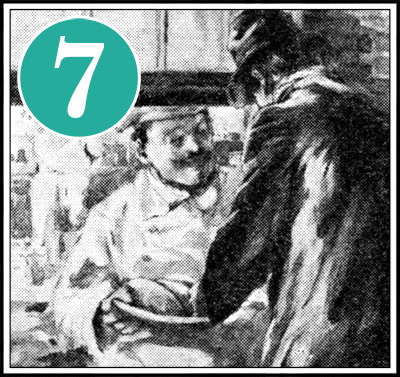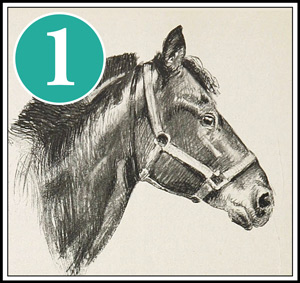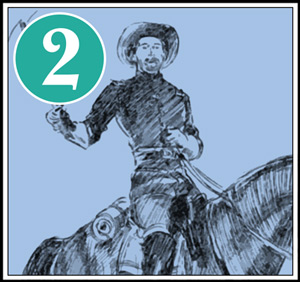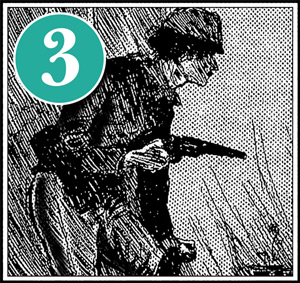
Lost Children
Episode 7 •
Lost Children
• It is not my fault that the one thing that is lost more persistently than any other in a large city is the very thing you would imagine to be safest of all in the keeping of its owner.
Podcast: Play in new window | Download
Subscribe: Apple Podcasts | Email | TuneIn | RSS

SHOW NOTES ____________
Lost Children
By Jacob Riis
I am not thinking now of theological dogmas or moral distinctions. I am considering the matter from the plain every-day standpoint of the police office. It is not my fault that the one thing that is lost more persistently than any other in a large city is the very thing you would imagine to be safest of all in the keeping of its owner. Nor do I pretend to explain it. It is simply one of the contradictions of metropolitan life. In twenty years’ acquaintance with the police office, I have seen money, diamonds, coffins, horses, and tubs of butter brought there and passed into the keeping of the property clerk as lost or strayed. I remember a whole front stoop, brownstone, with steps and iron railing all complete, being put up at auction, unclaimed. But these were mere representatives of a class which as a whole kept its place and the peace. The children did neither. One might have been tempted to apply the old inquiry about the pins to them but for another contradictory circumstance: rather more of them are found than lost.
The Society for the Prevention of Cruelty to Children keeps the account of the surplus. It has now on its books half a score Jane Does and twice as many Richard Roes, of whom nothing more will ever be known than that they were found, which is on the whole, perhaps, best—for them certainly. The others, the lost, drift from the tenements and back, a host of thousands year by year. The two I am thinking of were of these, typical of the maelstrom.
Yette Lubinsky was three years old when she was lost from her Essex-street home, in that neighborhood where once the police commissioners thought seriously of having the children tagged with name and street number, to save trotting them back and forth between police station and Headquarters. She had gone from the tenement to the corner where her father kept a stand, to beg a penny, and nothing more was known of her. Weeks after, a neighbor identified one of her little frocks as the match of one worn by a child she had seen dragged off by a rough-looking man. But though Max Lubinsky, the peddler, and Yette’s mother camped on the steps of Police Headquarters early and late, anxiously questioning every one who went in and out about their lost child, no other word was heard of her. By and by it came to be an old story, and the two were looked upon as among the fixtures of the place. Mulberry street has other such.
They were poor and friendless in a strange land, the very language of which was jargon to them, as theirs was to us, timid in the crush, and they were shouldered out. It was not inhumanity; at least, it was not meant to be. It was the way of the city, with every one for himself; and they accepted it, uncomplaining. So they kept their vigil on the stone steps, in storm and fair weather, every night, taking turns to watch all who passed. When it was a policeman with a little child, as it was many times between sunset and sunrise, the one on the watch would start up the minute they turned the corner, and run to meet them, eagerly scanning the little face, only to return, disappointed but not cast down, to the step upon which the other slept, head upon knees, waiting the summons to wake and watch.
Their mute sorrow appealed to me, then doing night duty in the newspaper office across the way, and I tried to help them in their search for the lost Yette. They accepted my help gratefully, trustfully, but without loud demonstration. Together we searched the police records, the hospitals, the morgue, and the long register of the river’s dead. She was not there. Having made sure of this, we turned to the children’s asylums. We had a description of Yette sent to each and every one, with the minutest particulars concerning her and her disappearance, but no word came back in response. A year passed, and we were compelled at last to give over the search. It seemed as if every means of finding out what had become of the child had been exhausted, and all alike had failed.
During the long search, I had occasion to go more than once to the Lubinskys’ home. They lived up three flights, in one of the big barracks that give to the lower end of Essex street the appearance of a deep black cañon with cliff-dwellers living in tiers all the way up, their watch-fires showing like so many dull red eyes through the night. The hall was pitch-dark, and the whole building redolent of the slum; but in the stuffy little room where the peddler lived there was, in spite of it all, an atmosphere of home that set it sharply apart from the rest. One of these visits I will always remember. I had stumbled in, unthinking, upon their Sabbath-eve meal. The candles were lighted, and the children gathered about the table; at its head, the father, every trace of the timid, shrinking peddler of Mulberry street laid aside with the week’s toil, was invoking the Sabbath blessing upon his house and all it harbored. I saw him turn, with a quiver of the lip, to a vacant seat between him and the mother; and it was then that I noticed the baby’s high chair, empty, but kept ever waiting for the little wanderer. I understood; and in the strength of domestic affection that burned with unquenched faith in the dark tenement after the many months of weary failure I read the history of this strange people that in every land and in every day has conquered even the slum with the hope of home.
It was not to be put to shame here, either. Yette returned, after all, and the way of it came near being stranger than all the rest. Two long years had passed, and the memory of her and hers had long since faded out of Mulberry street, when, in the overhauling of one of the children’s homes we thought we had canvassed thoroughly, the child turned up, as unaccountably as she had been lost. All that I ever learned about it was that she had been brought there, picked up by some one in the street, probably, and, after more or less inquiry that had failed to connect with the search at our end of the line, had been included in their flock on some formal commitment, and had stayed there. Not knowing her name,—she could not tell it herself, to be understood,—they had given her one of their own choosing; and thus disguised, she might have stayed there forever but for the fortunate chance that cast her up to the surface once more, and gave the clue to her identity at last. Even then her father had nearly as much trouble in proving his title to his child as he had had in looking for her, but in the end he made it good. The frock she had worn when she was lost proved the missing link. The mate of it was still carefully laid away in the tenement. So Yette returned to fill the empty chair at the Sabbath board, and the peddler’s faith was justified.
My other chip from the maelstrom was a lad half grown. He dropped into my office as if out of the clouds, one long and busy day, when, tired and out of sorts, I sat wishing my papers and the world in general in Halifax. I had not heard the knock, and when I looked up, there stood my boy, a stout, square-shouldered lad, with heavy cowhide boots and dull, honest eyes—eyes that looked into mine as if with a question they were about to put, and then gave it up, gazing straight ahead, stolid, impassive. It struck me that I had seen that face before, and I found out immediately where. The officer of the Children’s Aid Society who had brought him explained that Frands—that was his name—had been in the society’s care five months and over. They had found him drifting in the streets, and, knowing whither that drift set, had taken him in charge and sent him to one of their lodging-houses, where he had been since, doing chores and plodding about in his dull way. That was where I had met him. Now they had decided that he should go to Florida, if he would, but first they would like to find out something about him. They had never been able to, beyond the fact that he was from Denmark. He had put his finger on the map in the reading-room, one day, and shown them where he came from: that was the extent of their information on that point. So they had sent him to me to talk to him in his own tongue and see what I could make of him.
I addressed him in the politest Danish I was master of, and for an instant I saw the listening, questioning look return; but it vanished almost at once, and he answered in monosyllables, if at all. Much of what I said passed him entirely by. He did not seem to understand. By slow stages I got out of him that his father was a farm-laborer; that he had come over to look for his cousin, who worked in Passaic, New Jersey, and had found him,—Heaven knows how!—but had lost him again. Then he had drifted to New York, where the society’s officers had come upon him. He nodded when told that he was to be sent far away to the country, much as if I had spoken of some one he had never heard of. We had arrived at this point when I asked him the name of his native town.
The word he spoke came upon me with all the force of a sudden blow. I had played in the old village as a boy; all my childhood was bound up in its memories. For many years now I had not heard its name—not since boyhood days spoken as he spoke it. Perhaps it was because I was tired: the office faded away, desk, Headquarters across the street, boy, officer, business, and all. In their place were the brown heath I loved, the distant hills, the winding wagon-track, the peat-stacks, and the solitary sheep browsing on the barrows. Forgotten the thirty years, the seas that rolled between, the teeming city! I was at home again, a child. And there he stood, the boy, with it all in his dull, absent look. I read it now as plain as the day.
“Hua er et no? Ka do ett fostó hua a sejer?” [“Why, don’t you understand me?”]
It plumped out of me in the broad Jutland dialect I had neither heard nor spoken in half a lifetime, and so astonished me that I nearly fell off my chair. Sheep, peat-stacks, cairn, and hills all vanished together, and in place of the sweet heather there was the table with the tiresome papers. I reached out yearningly after the heath; I had not seen it for such a long time,—how long it did seem!—and—but in the same breath it was all there again in the smile that lighted up Frands’s broad face like a glint of sunlight from a leaden sky.
“Joesses, jou,” he laughed, “no ka a da saa grou godt.” [“Lord, yes. Now I do indeed.”]
It was the first honest Danish word he had heard since he came to this bewildering land. I read it in his face, no longer heavy or dull; saw it in the way he followed my speech—spelling the words, as it were, with his own lips, to lose no syllable; caught it in his glad smile as he went on telling me about his journey, his home, and his homesickness for the heath, with a breathless kind of haste, as if, now that at last he had a chance, he were afraid it was all a dream, and that he would presently wake up and find it gone. Then the officer pulled my sleeve.
He had coughed once or twice, but neither of us had heard him. Now he held out a paper he had brought, with an apologetic gesture. It was an agreement Frands was to sign, if he was going to Florida. I glanced at it. Florida? Yes, to be sure; oh, yes, Florida. I spoke to the officer, and it was in the Jutland dialect. I tried again, with no better luck. I saw him looking at me queerly, as if he thought it was not quite right with me, either, and then I recovered myself, and got back to the office and to America; but it was an effort. One does not skip across thirty years and two oceans, at my age, so easily as that.
And then the dull look came back into Frands’s eyes, and he nodded stolidly. Yes, he would go to Florida. The papers were made out, and off he went, after giving me a hearty hand-shake that warranted he would come out right when he became accustomed to the new country; but he took something with him which it hurt me to part with.
Frands is long since in Florida, growing up with the country, and little Yette is a young woman. So long ago was it that the current which sucked her under cast her up again, that there lives not in the whole street any one who can recall her loss. I tried to find one only the other day, but all the old people were dead or had moved away, and of the young, who were very anxious to help me, scarcely one was born at that time. But still the maelstrom drags down its victims; and far away lies my Danish heath under the gray October sky, hidden behind the seas.
• • • • • • • • • • • • • • • • • • • • • • • • • • • • • •
By subscribing, you will automatically receive the latest episodes downloaded to your computer or portable device. Select your preferred subscription method above.
To subscribe via a different application: Go to your favorite podcast application or news reader and enter this URL: https://clearwaterpress.com/byline/feed/podcast/



